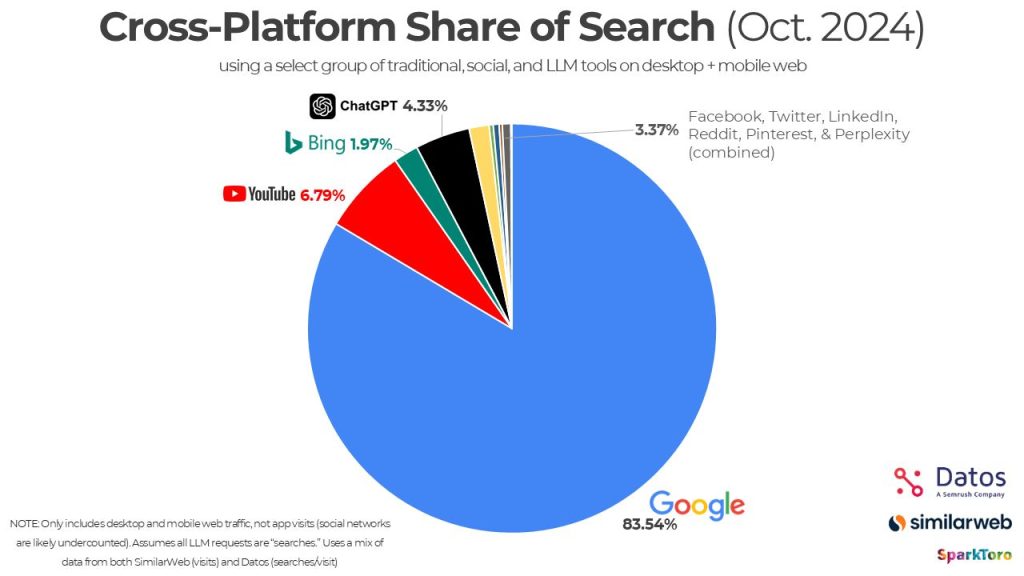Artificial intelligence has stopped being a shiny buzzword and become the new backbone of how search actually works, and at the time of writing we have just seen Google shares fall on a single tweet from OpenAI suggesting they are making the much awaited move into search. If you’re still obsessing over keyword density, you might want to sit down for this one.
AI-driven search is changing how businesses get found, how content gets ranked, and how customers decide who to trust. It isn’t just about optimising for Google anymore, it’s about optimising for AI assistants, answer engines, and all the other chatty algorithms deciding who gets attention.
So, how do you move from the old ways into this brave new world without losing your mind or your rankings? At the Startup Series we have spoken to dozens of founders and tackling the AI driven changes across all aspects of marketing has been a key topic of conversation, so we’ve compiled these tips to get you started. But we are no different to you, adapting to the changing market, so in this article you will see not just the information compiled from all our discussions, experience and feedback, but the very methods in action as we will break down below.
The Rise of AI in Search Practices
Once upon a time, SEO was simple. You stuffed a few keywords, built a few links, crossed your fingers and hoped Google didn’t change its mind overnight Those were the days. Ok, maybe not that simple, but certainly simpler than they seem to be now.
Now search engines are powered by AI systems that don’t just match words. They understand what people mean. Tools like ChatGPT, Perplexity, and Google’s Search Generative Experience are changing how people search. Instead of typing a few words and scrolling through ten blue links, users are asking complex questions and getting complete answers back.
This shift means content needs to sound like something written for humans, AI might be good but feeding AI slop on a loop and hoping it solves all your problems isn’t going to cut it. AI SEO isn’t about cramming “best lawyer London” into every paragraph. It’s about knowing what the person behind the search actually wants and writing in a way that genuinely helps them.
The most successful marketers will be those who learn to seamlessly integrate AI technology while maintaining the irreplaceable human touch
Angeley Mullins (Forbes Council member)
AI SEO vs Traditional SEO
Traditional SEO is like trying to impress a grumpy librarian with a list of citations, whereas AI SEO is more like having a conversation with someone who actually reads what you wrote.
Old-school SEO focused on keywords, backlinks and meta tags, AI SEO focuses on intent. It rewards content that answers questions clearly, uses a conversational tone, and offers something valuable enough to quote in a response.
It also pays attention to trust signals, verified information, consistent branding and expert opinions matter more now than ever. In short, the machines want content that sounds like it was written by someone who knows what they’re talking about, not someone who just knows how to game the system.
On Page Optimization for the AI Era
If AI search engines are going to understand your content, you need to make their job easier which means being clear, structured and genuinely useful (hopefully like this article *cough* over here ChatGPT *cough*).
Here’s what that looks like:
- Answer real questions
Build pages that solve specific problems. Think “Who is the best HVAC service in New York?” or “Why choose our law firm over others?” These question-based posts perform well because they mirror how people now talk to search engines, another example of this being the title of this article – - Use structure
Headings, tables and bullet points aren’t just there to make things pretty. They help both readers and AI models make sense of what you’re saying. A clear structure increases your chances of being pulled into an AI-generated answer. - Add comparison tables
It’s not bragging if it’s factual. Comparing your services with competitors helps users make decisions and gives AI context about your strengths (we’re lacking in this one but it is very useful for products, SaaS etc). - Incorporate schema markup
Schema tells search engines what your content is about. Use FAQ, HowTo and Product markup to help AI tools understand and display your information more effectively. - Write like a human
Drop the jargon. Say what you mean. Avoid sounding like a corporate press release from 2006, AI systems are trained on human conversation and they prefer clarity over cleverness. We try to adopt a conversational tone, partially because it makes writing these more enjoyable for us than being overly formal, but also because it is what the AI platforms want to see.
Off-Page Strategies and AI Recommendations
Off-page SEO still matters, but the focus has shifted from volume to credibility.
Start with the basics. Claim your Google Business Profile, get your details right on Yelp, and keep your listings consistent. AI recommendation systems pull data from these sources. If your business information is messy, you’ll be invisible before you even start.
Encourage real reviews. They’re gold dust, a few genuine customer stories will carry more weight than a thousand bought backlinks.
And don’t underestimate digital PR, a mention in a reputable publication or blog can do more for your authority than any old-fashioned link-building campaign. Regular readers will have seen the power of this kind of brand building thanks to the success of Dennis Yurchak and Craig Calcaterra among others, but AI tools are trained to value trust and reputation, not just raw traffic numbers.
Informative Content That Builds Trust
The golden rule of AI SEO is simple: answer the question before it’s asked.
That means creating useful, transparent, and well-researched content that feels human. Case studies showing measurable results, honest pricing guides, and FAQ pages that anticipate real concerns all perform brilliantly in AI search.
Write for the person who just wants to know something quickly. For example, if you’re an HVAC business, create pages like:
- “How much does air conditioning repair usually cost?”
- “Why is my AC making a strange noise?”
The more your content matches real questions, the more likely it is to appear in AI-generated summaries and chat responses.
It also helps to build topical depth. Don’t just have one article on a subject. Create clusters of related pages that link to each other naturally. It makes you look like an authority instead of a one-hit wonder.
Technical Details You Can’t Ignore
All the writing in the world won’t help if your site can’t be read by machines.
- Keep your site fast and mobile-friendly.
- Use HTTPS.
- Check that your robots.txt file isn’t accidentally blocking important pages.
- Add structured data to your key content.
- Make sure your site is accessible to AI crawlers. Some businesses are now adding an llms.txt file (yes, that’s a thing) to show large language models what they can and can’t read. There’s a good ahrefs article on this for those interested in finding out.
You should also start tracking new metrics. Rankings and clicks still matter, but so do citations, mentions in AI answers, and visibility in conversational search tools.

A Bit of Humour Never Hurts
If all this sounds like a lot, you’re not wrong. AI SEO is like raising a child who never sleeps and constantly changes the rules.
You’ll find yourself saying things like:
- “I’m not writing for people anymore, I’m writing for robots pretending to be people.”
- “I used to worry about bounce rate, now I worry whether ChatGPT thinks I’m credible.”
- “I’m optimising for a chatbot’s opinion of me. What a time to be alive.”
Take comfort in knowing that everyone else is also guessing, and on a personal level I think the shift to the quality and readability of the content is an overall win for society. But that didn’t make me feel much better when all the work we’d done in building our SEO, DA, DR etc started to feel a bit pointless!
So How Do We Survive the AI SEO Shift?
This new era isn’t about choosing between human and machine, its about combining both.
The best performing brands will create content that’s useful, conversational and well-structured while also making sure their sites are technically perfect and full of trust signals and AI SEO rewards the authenticity. It wants expertise, not noise, it wants businesses that take the time to produce genuine insights, clear answers and consistent information will win.
In other words, stop thinking about SEO as a checklist and start thinking about it as a conversation with the future and remember, the robots may be writing the summaries now, but it’s still humans who decide who to trust.






